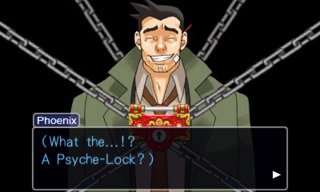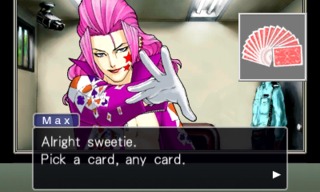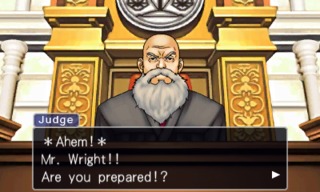There was a time Phoenix Wright was the game to own for Nintendo's little dual-screen wonder. It was the kind of game no one was making on a system that was meant to do what no one else was doing. That made it special. Fast forward to 2014, four sequels and two spin-offs later, and now we have the first three games--Ace Attorney, Justice For All, and Trials & Tribulations--cleaned up, brushed off, given a simple 3D spitshine, and trotted out to the Nintendo eShop. The gameplay has remained untouched, for better and worse: You're still playing the well-coiffed crusader of justice called in to collect clues from crime scenes, scream objections when you've caught ne'er-do-wells in a lie, and ask all the right questions to make the most weird and wild collection of bad guys and gals since Adam West's Batman all lose their cool on the witness stand. The good news is that, at least conceptually, the original Phoenix Wright trilogy has held up very well over time. The problem is that it's not exactly special anymore.
It's actually a great problem to have. Point-and-click adventures and visual novels like Phoenix Wright are in vogue, and games are pushing the envelope several times a year. Even with that being the case, courtroom drama isn't exactly a crowded subgenre, and, as such, the Phoenix Wright games are still a unique snowflake in that regard. Where the Phoenix Wright games still stand out among the lot of them is in sheer charm. The streamlined anime art style, and the games' jovial sense of humor permeate everything. Phoenix Wright's world is a world of over-exaggerated reactions to everything, of eye-rolling yet brilliant puns, of unsubtle but slick pop culture references (personal favorite: The clown-based Fresh Prince of Bel-Air reference in Justice For All), and of fully formed, distinct, and wildly imaginative casts of characters with story arcs stretching over multiple games. Even though we're still dealing with murders--an overwhelming number of murders, but we'll get to that--there's such a lightness and color to the game it's hard to resist spending time with them over and over again as opposed to, say, The Vanishing of Ethan Carter's dour menagerie.

The series forgoes any sort of CSI-style deep diving to present the player with problems of logic, and using observation to point out glaring inconsistencies in the stories of liars, cheats, and murderers instead of just rote item collection, where the game is on rails as long as you have the right item in your possession. It's not a perfect system, especially the more complex the case is. There are dozens of instances where the judge asks for a clue to prove the witness is a liar, and the clue that makes sense in real life is not the one the game actually marks as correct, but for the most part, there's a common sense to advancing in all three games. In that regard, it's still old school in the best way: the player's intellect, not their talent for scrounging, is the core of the gameplay here.

And yet, there was an opportunity with the Ace Attorney Trilogy. Every year that passes, every time the game gets ported to a new platform, the series' GBA roots become more and more obvious, and its limitations become glaring. Its simplified anime art-style, while functional, can be seen here as consistent, but often repetitive, with the series' recent efforts towards innovation all occurring in the games after Trials and Tribulations released. The cases are almost always murders, with only rare variations to investigate a clue, or get a witness' story straight, and, more often than not, the game shows you who did it before Phoenix is allowed to figure it out. Interrogation methods haven't improved in all three games, though Justice For All's Psyche Lock system, a way of picking at a witness' testimony to get to their deepest secrets, is nice, though an even more cartoony addition than needed. But more than anything, the three games have been ported to multiple systems now, and the only real enhancements have been to the graphics. The 3DS trilogy is, to its credit, the sharpest it has ever looked or sounded. The extra real estate from the top screen has been put to good use, and the 3D is subtle, but the layering effect of all the character art is a nice, effective touch.

Meanwhile, the 3DS has seen its own exclusive Phoenix Wright sequel that finally brings all the innovation the fancy new hardware can afford to the table. It would've been a painstaking process, no doubt, but the first Phoenix Wright's final mission brings such welcome changes to the table, using the DS's audio and touchscreen functions, that the other two games, which still haven't gotten a similar treatment, are dimmed by comparison. Instead, the only other real enhancement to this new version is the ability to play the games in their original Japanese forms, which is neat if you understand Japanese, though Jeremy Blaustein's English localization is wonderful enough as it is.
There is, of course, the off-chance that the trilogy might be someone's first exposure to the life and times of Phoenix Wright, or at least their first exposure in a great many years, and it's as refined a jumping-off point for that as can be expected. For anyone for whom this is their third, four, or fifth time around, there's nothing new to discover, aside from the convenience of having all three games in one handy digital package. There's nothing inherently wrong with that, but knowing what the 3DS and this series is capable of, the games' flaws have never been more glaring, and not nearly enough has been done to overrule the objections players have had for years.